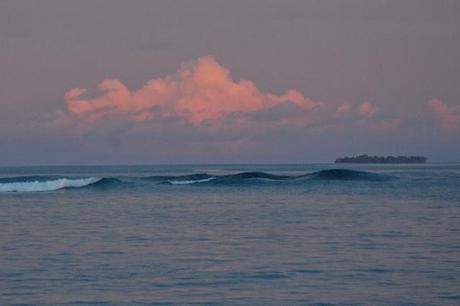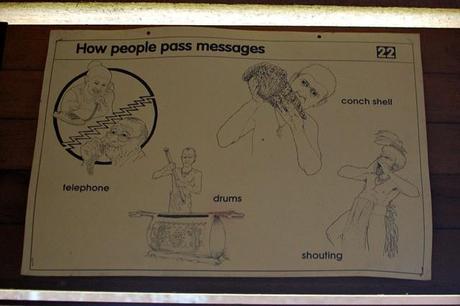We were grateful for Paul’s help finding the shipwreck in Three Island Harbour and enjoyed his company, so invited he and his family out in the evening.
 Beautiful sunsets near New Hanover Island
Beautiful sunsets near New Hanover Island
Paul paddled out to Totem after sunset; sitting in the evening breeze and eating dinner together, we talk about his home. He grew up on the adjacent island, attending school until he was a teenager and his father told him to fail the test to pass to the next grade. He was needed at home to help with the family’s fishing. Piloting the boat for years evolved to work at the small resort on Tunung, helping drive tourists around to dive or surf sites. It’s closed temporarily, but it’s given him a good living: the owner helps support his employees with not just cash but goods and materials they can’t easily access otherwise, such as lumber and nails for their homes.
Like a lot of people we've met in PNG, Paul is smart and frustrated. Tourism gives him the exposure to how much he’s missing, and the near impossibility for people to get ahead. He wants to save for his children’s future, but can’t use a bank – there isn't one that’s practically accessible (the only transportation, private boat, translates to a fuel cost that’s too high for a casual visit- probably a month’s earnings- and fees charged for small accounts only deplete meager savings). He sees the ripple effect of logging on adjacent New Hanover. Elders sign away rights to their people’s land for grossly undervalued payment and without understanding the consequences of clear cutting. We hear that often, the land is appropriated without consent- that the power of money shifted to the right hands overcomes obstacles, and put signatures on documents from people who may not even be alive. Workers brought in from outside the local social structure introduce alcohol and violence to communities that can’t sanction them through traditional means, and don’t have the public services to handle the fallout. Fish are getting harder to find, as massive ships take everything from the waters when they pass through, making subsistence living that much more difficult. The wealth being extracted is massive, yet he has no opportunity to participate, and none of it goes to basic public services or improvements. For all the money being earned by a precious few, there is still not a road to connect the coastline of New Hanover, the schools are under-served, there is no public transportation or regular boat services connecting communities, and meager health “clinics” sprinkled through islands are under equipped and staffed.
Paul has every right to be extremely angry. To be sure, he’s frustrated: with the foreign companies that take blindly, with the government chooses to be bought instead of supporting the people they are supposed to represent. But he’s not an angry person. He doesn't accept it, but he doesn't know what to do. How can people organize, when they don’t have communication or transportation, much less running water, electricity, or other basic public services?
Talking into the night, feeling the pain of his helplessness, we try to think about the possibilities. Why does PNG seem so far off the radar of environmental and social justice organizations, or NGOs who can support better lives? The only imported goodwill seems to be missionaries, but spiritual fulfilment doesn't feed your family or send your kids to school. There are opportunities for tourism, but the cost, corruption, and infrastructure get in the way.
 Schoolroom poster about modes of communication in PNG
Schoolroom poster about modes of communication in PNG
The local ‘wantok’ system factors meaningfully here too. Wantok, a tok pisin word that comes from “one talk,” refers to the circle of a greater extended family (it can also include friends). In PNG, the wantok system obligates members of an extended family to help each other out. This is a subject for much more detailed explanation, but suffice to say here that this works well in a lot of ways- strong family ties mean that children are raised by a village, food is available for the hungry, elders are cared for by their grown children. But it’s also a limitation to progress. There is little motivation to achieve success for many when it means all their wantoks will come to them with their hands out: they cannot be refused. The wantok system also means that jobs are handed out based on relationships, and not merit. Money and opportunity go to those who have family connections.
It’s a complex problem, and one we’re not going to solve with our late night cockpit discussions. But as Paul paddles away, it’s impossible not to dwell on the big changes needed for people in PNG.

